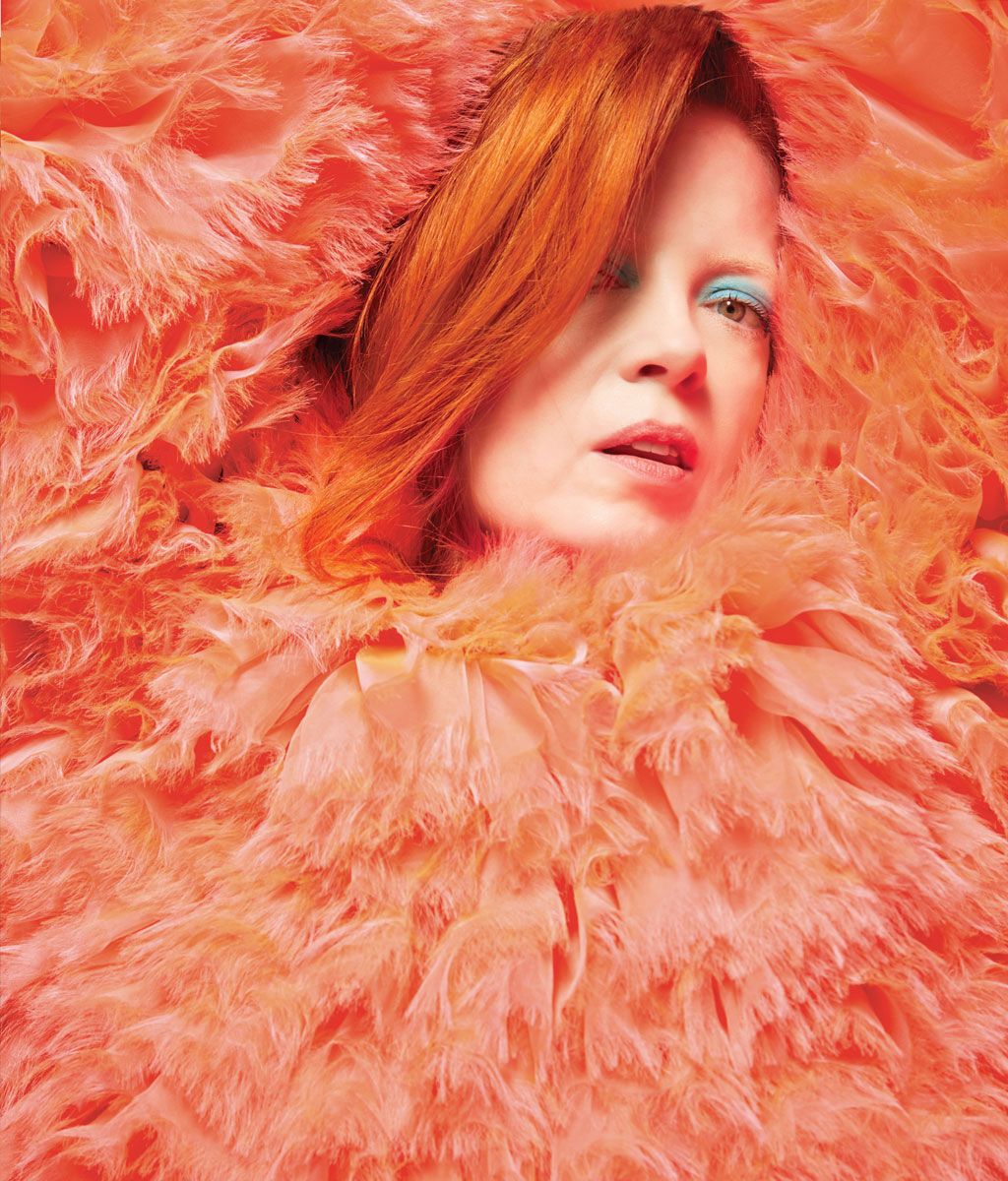As she rifles through neat piles of iron-on patches, tarot-card decks, and baby-pink notebooks, Shirley Manson’s slowly graying undershave is visible beneath a fiery red bun. “My [7 year old] niece would love it here!” she declares, “here” being Junior High, a new feminist art-gallery-meets-community-space in East Hollywood. “Had I walked past on my own, I probably would have been too intimidated to come in.”
It’s hard to imagine the 50-year-old Scottish frontwoman of ‘90s post-grunge band Garbage being intimidated by anything, though the gallery’s augmented reality exhibit and Justin Bieber stickers skew more millennial than Gen X. Walking through the open storefront, she picks up a patch that reads WEIRDOS and says, “This is literally my idea of heaven.” Manson remains nimble, both embracing and appraising current trends, as she reflects on all that has changed over her 30-plus-year career in the music business.
This summer, 22 years after releasing their debut record, Garbage will embark on a co-headlining U.S. tour with Blondie, led by 71-year-old Debbie Harry. For Manson, the tour, which will promote Blondie’s 11th record, Pollinator, and Garbage’s 6th, Strange Little Birds, presents an opportunity to exalt the archetype of the female rockstar amid her fears that she is becoming extinct.
“[Debbie Harry and I] are some of the few women left who do what we do in the way that we do it. We’re getting rarer and rarer. I think people understand that this breed is dying.” She pauses, and adds, “Literally dying.” Harry and Manson belong to a generation of women musicians who, as she puts it, “write their own music and aren’t chasing pop success,” but Manson worries that the bloodline is thinning. Patti Smith is 70. Chrissie Hynde, 65. Courtney Love, 52. “I was having a funny conversation with Karen O about this at a party the other night,” she says of the 38-year-old lead vocalist of the Yeah Yeah Yeahs, as a Jenny Lewis (41) song plays over Junior High’s speaker system. “We were like, ‘We’re the last of the rockers!’”
For Manson, many of the music industry’s current megastars fail to pass her rock litmus test. “Rihanna is the closest thing we have in the pop world to a rockstar,” she muses, adding that she’s a huge fan of pop music. “If Rihanna wanted to make rock music, I’m sure she could. But unless you’re playing rock music, you’re not a rockstar.”
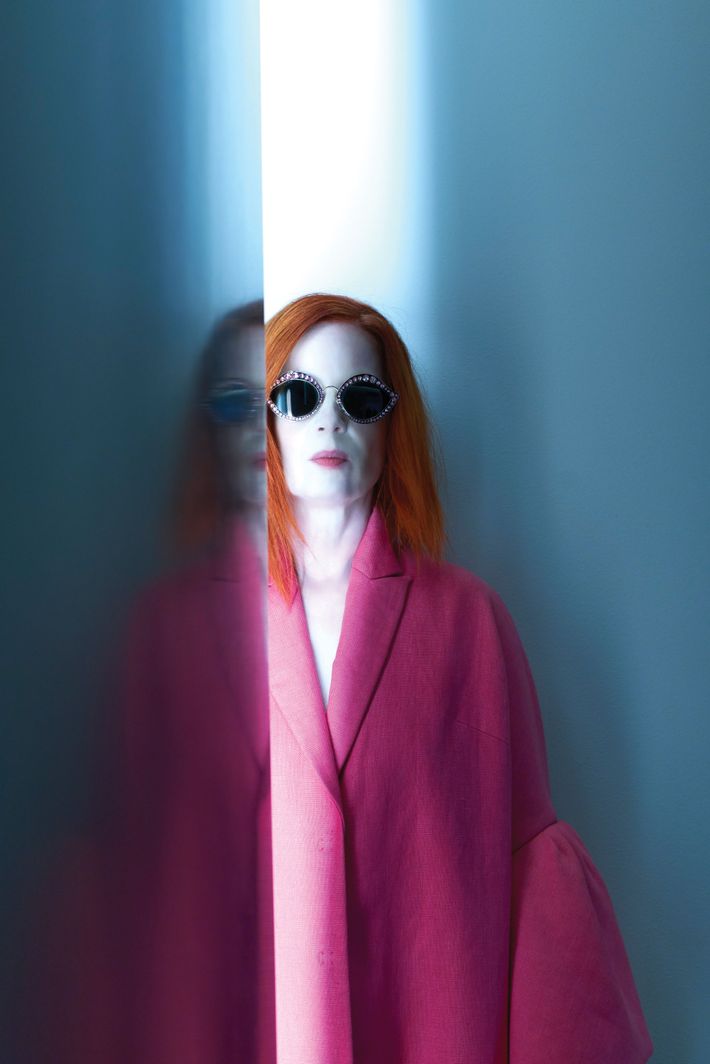
In preparation for the upcoming tour, Manson has been thinking a lot about the past and her band’s place in it. This July, Garbage will release a coffee-table book full of artifacts, photos, and anecdotes that capture their long history: pages of lyrics with penciled-in edits, cocktail recipes — like one for “Vodka With Anything” — and snapshots from a forgotten era where Manson wore her hair boy-short and platinum blonde. “We’re all fucking getting up there,” she says, eyes rolling. “We wanted to leave something behind for the wee ones.”
The book, titled This Is the Noise That Keeps Me Awake after a lyric in Garbage’s 1998 single, “Push It,” shows how the band rose out of grunge’s ashes after groups like Nirvana and Soundgarden began to fade away. By comparison, Garbage had a much more commercial sound, a deliberate decision on the part of the band’s drummer and producer Butch Vig. Vig, who was already well-known for producing Nirvana’s Nevermind, mixed elements of trip hop, electronic, and pop on top of grunge on Garbage’s successful self-titled first album. The result were radio-friendly — albeit still angsty — hits, “Only Happy When It Rains” and “Stupid Girl.” An update on their predecessors, though, was standing front and center: Garbage’s lead singer was a woman.
“When success occurred to us, it didn’t feel personal,” Manson says of the early days of Garbage as we sit drinking martinis at Musso & Frank’s, a 100-year-old Hollywood steakhouse where Manson is a frequent visitor. Looking back, she sees Garbage’s success as a part of something larger than just hard work or talent. “I understood logically that this was a zeitgeist moment,” she says.
Following the overabundance of testosterone in the early grunge era, the mid-’90s saw the rise of the alternative girl — Alanis Morissette’s’ Jagged Little Pill, No Doubt’s Tragic Kingdom, and Björk’s Post all released the same year as the first Garbage record — and Manson became one of several potent figures for the female fans grunge had left behind.
“We were in the right place at the right time and we were making the right kind of music,” she says. “I’m the right kind of voice. I had the right look.” Manson had been in bands for ten years before she became successful as the ginger Scot in black eyeliner and combat boots. “It wasn’t that we were brilliant. I have friends who could have peed all over our talent.”
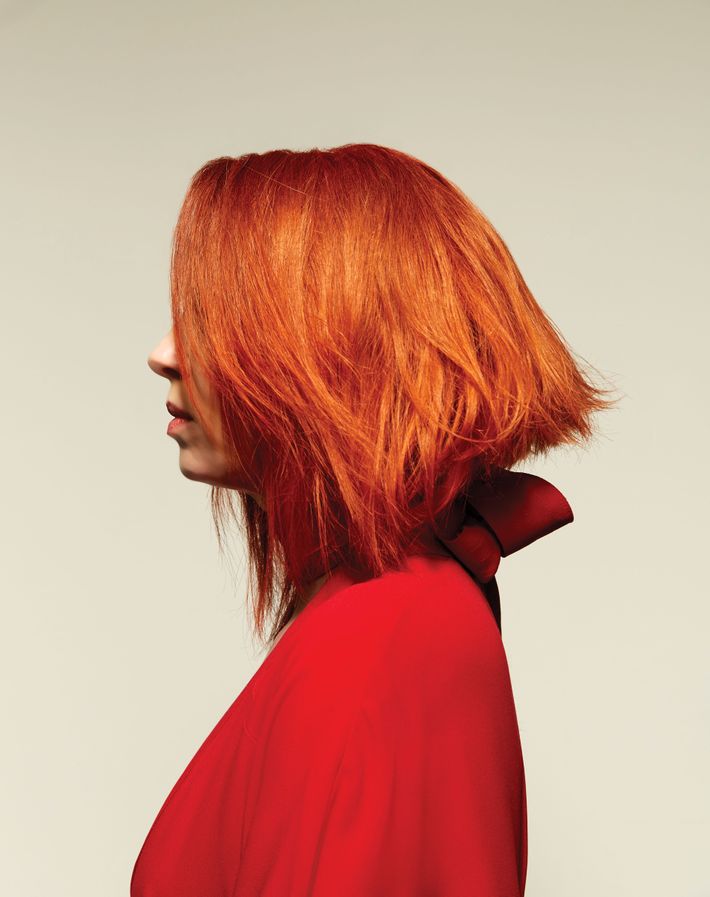
The group’s second album, released in 1998, earned them a Grammy nomination for album of the year, and “#1 Crush,” a song the group wrote for Baz Luhrmann’s Romeo + Juliet, gave them even more cultural cache with an angsty younger following. The 2000s were a difficult time for the band — with record-contract disputes and an eventual hiatus — as the winnowing popularity of alternative rock gave way to a gentler indie-rock sound. But Garbage found its foothold again recently, thanks to a wave of ‘90s nostalgia that brought grunge and shoegaze back into popular culture.
Reflecting on the band’s resurgence, Manson told Rolling Stone in 2015, “I’m not surprised in retrospect that people love that record. I’m surprised that we managed to get to the point in our career where enough time had passed that people could look back and appreciate it again. I didn’t ever expect it to last the course of time.”
“Now, our culture doesn’t value anything that’s not massive,” she says of music tastes today. “It seems like people are in awe of mass consumption. The bigger the artist, somehow the more special. That’s just not what I was brought up to believe in at all. I’ve never been a Taylor Swift, I’ve never been that famous. I can’t begin to imagine what that must be like. But you don’t get to that level accidentally — you court that level of success.”
“The generation that I was brought up in, we were embarrassed if you were successful, (which was also fucked up, by the way),” she adds. “We found that vulgar. Nobody wanted to sell out — but now everybody is happy to.”
But Manson also acknowledges the fact that, hey, she’s been wrong about things before. “When I was 30, I thought I had everything sussed out,” she says as she adjusts a bandanna tied around her neck. “I thought I knew everything. Then I hit 40, and I looked back at 30 and thought, ‘What a clown. I knew nothing.’ I thought I was ancient at 40, but now I’m 50 and I realize I was really just a young woman. You can change your fucking mind. I want to be able to be agile enough and brave enough to say I was wrong.”
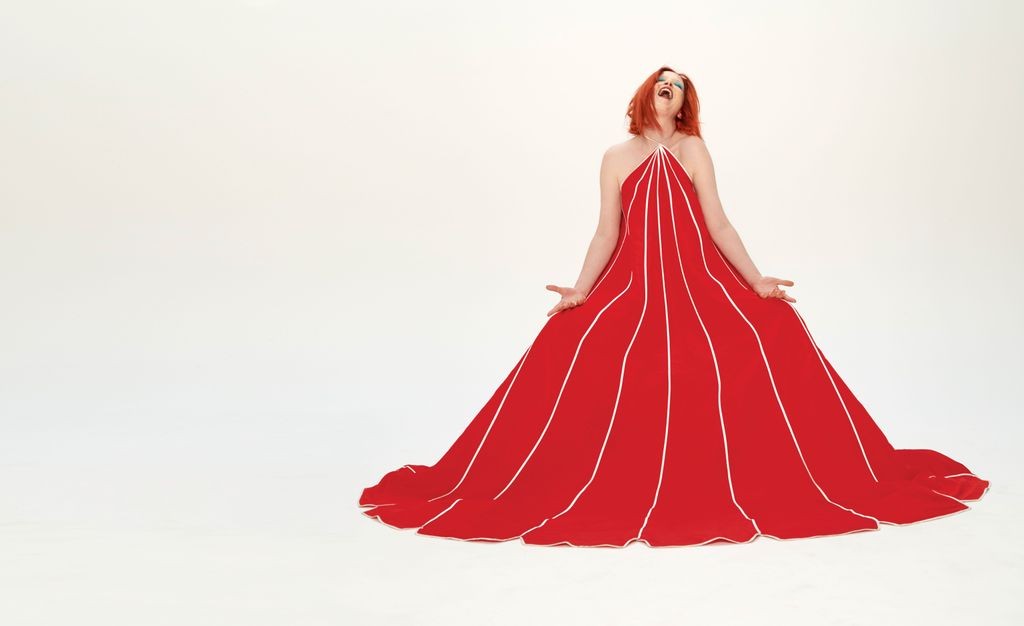
But is she really one of the last female rockstars? Maybe of her generation. But dozens of women musicians in DIY rock and punk scenes see the path Manson took as a viable model for their own. “Garbage wouldn’t have had the lasting impact they have had on me if it weren’t a woman singing,” says Ally Einbinder, the bass player in an all-female punk band Potty Mouth, adding that their upcoming record is explicitly influenced by Garbage. Screaming Females’ guitarist Marissa Paternoster, whose band went on tour with Garbage in 2013, agreed. “Shirley was the most honest in her darkness. Gwen Stefani was a great inspiration for me but she didn’t have that sharp edge that I was looking for. That’s what attracted me to Garbage: Shirley’s transparency and vulnerability.”
It helps that many feel Manson’s message hasn’t changed much. “Shirley is one of the few women musicians I looked up to in high school who didn’t go on to disappoint me,” said Cynthia Schemmer, a guitar player and songwriter for punk bands Radiator Hospital and Swanning. “A lot of women I looked up to kind of ‘got over’ feminism, or switched personas, and I feel like she really just stood her ground.”
As she gets older, Manson says, she’s becoming even “more outraged” as a woman and as a feminist. “To me, [feminism] is about equality. It’s nothing to do with whether we like makeup or don’t like makeup.” (Manson does.) “Feminism has nothing to do with whether you have children or not.” (She doesn’t.) “It’s really just: How about you pay me the same fucking amount that you just paid him? I just did the same fucking job. If your husband gets this, so do you. If your boyfriend is doing this, and you want to do that, then you get to do it, too. It’s that simple.”
Her Christian upbringing is partially responsible for inspiring a lifetime of questioning and rebellion. “I remember many older women making jokes like, ‘Just lie back and think of England.’ Basically they were saying sex was your duty. Your sexuality had nothing to do whatsoever with the sexual act. We became receptacles.” When she saw hypocrisies in organized religion as an adolescent, she stopped attending church altogether. She hasn’t been back since.
“Clearly some of that outrage does go into music for me,” she says, “but in general it goes into me being me in the world. I don’t get too despondent.”
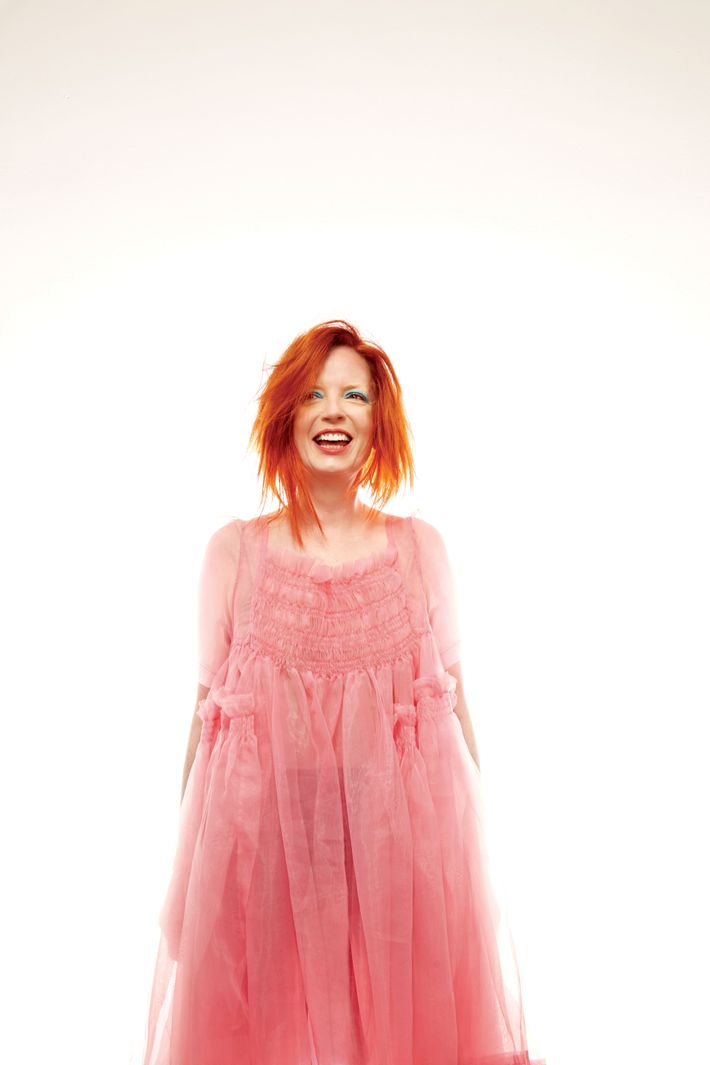
As we finish up our martinis, Manson spots Donita Sparks, guitarist and front woman for grunge band L7, walking towards us at the bar. Sparks made rock history in 1992 when she threw her used tampon into an aggrieved crowd and shouted, “Eat my used tampon, fuckers!”
Manson and Sparks do some lively catching up. “Did you go to the PJ Harvey show last weekend?” Manson asks Sparks, who says she did not. “Cor,” Manson exclaims, throwing her head back dramatically, “it was devastating. It was so spectacular.”
“I feel bad because I haven’t checked out her early stuff like you told me to,” Sparks admits.
“Come on, Donita, you’ll love it. I’m telling you.” To this, Sparks nods, surrendering. “I know, I know. I’ve always loved her vibe.”
Manson and I pick up where we left off — on religion, on death, on sex, on a chastity-belt-style outfit that a Russian designer had custom-made for her (“I looked like Joan of Arc”) — moving on from her run-in with Sparks as if it were completely ordinary. But after our conversation, it took on considerable more significance: two members of Manson’s so-called “dying breed” in the flesh, exchanging recommendations for another vaulted member of their clan.
Outside of the steakhouse in the harsh L.A. sunlight, I mention to Manson that I’m turning 30 next week. She belts out a laugh — her head tilted back and mouth wide open — as she grabs me by the shoulder like a coach giving a pep talk to a rookie.
“Come on, girl,” she says. “You’re young yet.”
Top Image: Gucci silk organdy coat, at select Gucci stores; 212-826-2600.
Styling by Rebecca Ramsey and Candice Lambert; makeup by Amy Chance using Surratt Beauty at Celestine Agency; hair by Clyde Haygood at Forward Artists using T3 Tools; styling assistance by Sarah Kinsumba.
*This article appears in the May 29, 2017, issue of New York Magazine.
